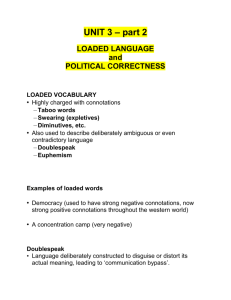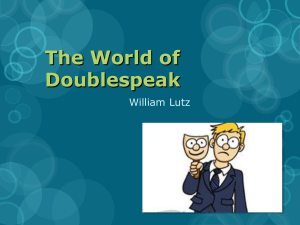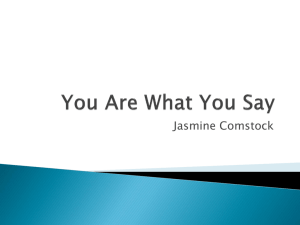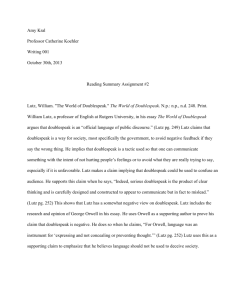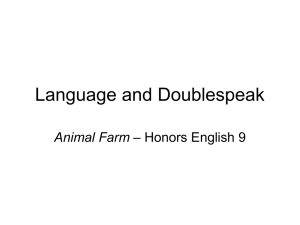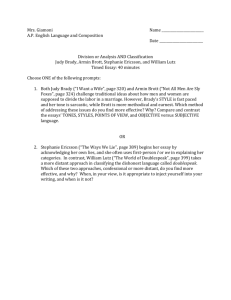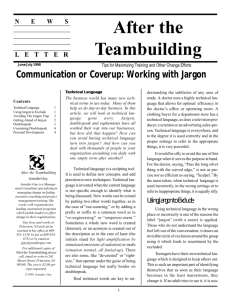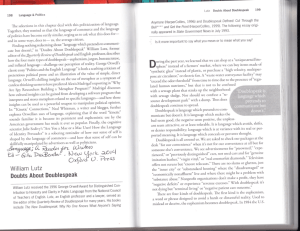Four Kinds of Doublespeak
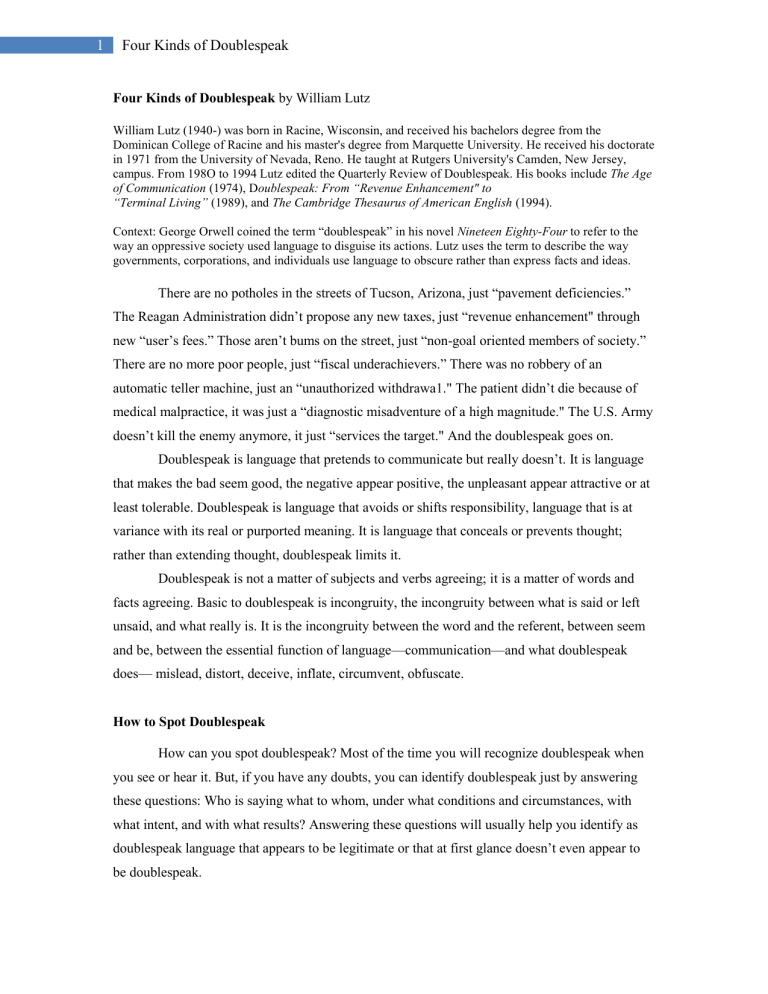
1 Four Kinds of Doublespeak
Four Kinds of Doublespeak by William Lutz
William Lutz (1940-) was born in Racine, Wisconsin, and received his bachelors degree from the
Dominican College of Racine and his master's degree from Marquette University. He received his doctorate in 1971 from the University of Nevada, Reno. He taught at Rutgers University's Camden, New Jersey, campus. From 198O to 1994 Lutz edited the Quarterly Review of Doublespeak. His books include The Age of Communication (1974), D oublespeak: From “Revenue Enhancement" to
“Terminal Living” (1989), and The Cambridge Thesaurus of American English (1994).
Context: George Orwell coined the term “doublespeak” in his novel Nineteen Eighty-Four to refer to the way an oppressive society used language to disguise its actions. Lutz uses the term to describe the way governments, corporations, and individuals use language to obscure rather than express facts and ideas.
There are no potholes in the streets of Tucson, Arizona, just “pavement deficiencies.”
The Reagan Administration didn’t propose any new taxes, just “revenue enhancement" through new “user’s fees.” Those aren’t bums on the street, just “non-goal oriented members of society.”
There are no more poor people, just “fiscal underachievers.” There was no robbery of an automatic teller machine, just an “unauthorized withdrawa1." The patient didn’t die because of medical malpractice, it was just a “diagnostic misadventure of a high magnitude." The U.S. Army doesn’t kill the enemy anymore, it just “services the target." And the doublespeak goes on.
Doublespeak is language that pretends to communicate but really doesn’t. It is language that makes the bad seem good, the negative appear positive, the unpleasant appear attractive or at least tolerable. Doublespeak is language that avoids or shifts responsibility, language that is at variance with its real or purported meaning. It is language that conceals or prevents thought; rather than extending thought, doublespeak limits it.
Doublespeak is not a matter of subjects and verbs agreeing; it is a matter of words and facts agreeing. Basic to doublespeak is incongruity, the incongruity between what is said or left unsaid, and what really is. It is the incongruity between the word and the referent, between seem and be, between the essential function of language—communication—and what doublespeak does— mislead, distort, deceive, inflate, circumvent, obfuscate.
How to Spot Doublespeak
How can you spot doublespeak? Most of the time you will recognize doublespeak when you see or hear it. But, if you have any doubts, you can identify doublespeak just by answering these questions: Who is saying what to whom, under what conditions and circumstances, with what intent, and with what results? Answering these questions will usually help you identify as doublespeak language that appears to be legitimate or that at first glance doesn’t even appear to be doublespeak.
2 Four Kinds of Doublespeak
First Kind of Doublespeak
There are at least four kinds of doublespeak. The first is the euphemism, an inoffensive or positive word or phrase used to avoid a harsh, unpleasant, or distasteful reality. But a euphemism can also be a tactful word or phrase which avoids directly mentioning a painful reality, or it can be an expression used out of concern for the feelings of someone else, or to avoid directly discussing a topic subject to a social or cultural taboo.
When you use a euphemism because of your sensitivity for someone’s feelings or out of concern for a recognized social or cultural taboo, it is not doublespeak, For example, you express your condolences that someone has “passed away” because you do not want to say to a grieving person, “I’m sorry your father is dead.” When you use the euphemism “passed away,” no one is misled. Moreover, the euphemism functions here not just to protect the feelings of another person, but to communicate also your concern for that person`s feelings during a period of mourning. When you excuse yourself to go to the “rest room," or you mention that someone is
“sleeping with” or “involved with" someone else, you do not mislead anyone about your meaning, but you do respect the social taboos about discussing bodily functions and sex in direct terms. You also indicate your sensitivity to the feelings of your audience, which is usually considered a mark of courtesy and good manners.
However, when a euphemism is used to mislead or deceive, it becomes doublespeak. For example, in 1984 the U.S. State Department announced that it would no longer use the word
“killing" in its annual report on the status of human rights in countries around the world. Instead, it would use the phrase “unlawful or arbitrary deprivation of life," which the department claimed was more accurate. Its real purpose for using this phrase was simply to avoid discussing the embarrassing situation of government-sanctioned killings in countries that are supported by the
United States and have been certified by the United States as respecting the human rights of their citizens. This use of a euphemism constitutes doublespeak, since it is designed to mislead, to cover up the unpleasant. Its real intent is at variance with its apparent intent. It is language designed to alter our perception of reality.
The Pentagon, too, avoids discussing unpleasant realities when it refers to bombs and artillery shells that fall on civilian targets as “incontinent ordnance.” And in 1977 the Pentagon tried to slip funding for the neutron bomb unnoticed into an appropriations bill by calling it a
“radiation enhancement device.”
3 Four Kinds of Doublespeak
Second Kind of Doublespeak
A second kind of doublespeak is jargon, the specialized language of a trade, profession, or similar group, such as that used by doctors, lawyers, engineers, educators, or car mechanics. Jargon can serve an important and useful function. Within a group, jargon functions as a kind of verbal shorthand that allows members of the group to communicate with each other clearly, efficiently, and quickly. Indeed, it is a mark of membership in the group to be able to use and understand the group’s jargon.
But jargon, like the euphemism, can also be doublespeak. It can be—and often is— pretentious, obscure, and esoteric terminology used to give an air of profundity, authority, and prestige to speakers and their subject matter. Jargon as doublespeak often makes the simple appear complex, the ordinary profound, the obvious insightful. In this sense it is used not to express but impress. With such doublespeak, the act of smelling something becomes
"organoleptic analysis,” glass becomes “fused silicate," a crack in a metal support beam becomes a “discontinuity,” conservative economic policies become “distributionally conservative notions.”
Lawyers, for example, speak of an “involuntary conversion” of property when discussing the loss or destruction of property through theft, accident, or condemnation. If your house burns down or if your car is stolen, you have suffered an involuntary conversion of your property.
When used by lawyers in a legal situation, such jargon is a legitimate use of language, since lawyers can be expected to understand the term.
However, when a member of a specialized group uses its jargon to communicate with a person outside the group, and uses it knowing that the nonmember does not understand such language, then there is doublespeak. For example, on May 9, 1978, a National Airlines 727 airplane crashed while attempting to land at the Pensacola, Florida airport. Three of the fifty-two passengers aboard the airplane were killed. As a result of the crash, National made an after-tax insurance benefit of $1.7 million, or an extra l8¢ a share dividend for its stockholders. Now
National Airlines had two problems: It did not want to talk about one of its airplanes crashing, and it had to account for the $1.7 million when it issued its annual report to its stockholders.
National solved the problem by inserting a footnote in its annual report which explained that the
$1.7 million income was due to “the involuntary conversion of a 727.” National thus acknowledged the crash of its airplane and the subsequent profit it made from the crash, without once mentioning the accident or the deaths. However, because airline officials knew that most stockholders in the company, and indeed most of the general public, were not familiar with legal jargon, the use of such jargon constituted doublespeak.
4 Four Kinds of Doublespeak
Third Kind of Doublespeak
A third kind of doublespeak is gobbledygook or bureaucratese. Basically, such doublespeak is simply a matter of piling on words, of overwhelming the audience with words, the bigger the words and the longer the sentences the better. Alan Greenspan, then chair of President
Nixon’s Council of Economic Advisors, was quoted in The Philadelphia Inquirer in 1974 as having testified before a Senate committee that “1t is a tricky problem to find the particular calibration in timing that would be appropriate to stem the acceleration in risk premiums created by falling incomes without prematurely aborting the decline in the inflation-generated risk premiums.”
Nor has Mr. Greenspan’s language changed since then. Speaking to the meeting of the
Economic Club of New York in 1988, Mr. Greenspan, now Federal Reserve chair, said, “I guess I should warn you, if I turn out to be particularly clear, you’ve probably misunderstood what I’ve said.” Mr. Greenspan’s doublespeak doesn’t seem to have held back his career.
Sometimes gobbledygook may sound impressive, but when the quote is later examined in print it doesn’t even make sense. During the 1988 presidential campaign, vice-presidential candidate Senator Dan Quayle explained the need for a strategic-defense initiative by saying,
“Why wouldn’t an enhanced deterrent, a more stable peace, a better prospect to denying the ones who enter conflict in the first place to have a reduction of offensive systems and an introduction to defensive capability? I believe this is the route the country will eventually go.”
The investigation into the Challenger disaster in 1986 revealed the doublespeak of gobbledygook and bureaucratese used by too many involved in the shuttle program. When Jesse
Moore, NASA’s associate administrator, was asked if the performance of the shuttle program had improved with each launch or if it had remained the same, he answered, I think our performance in terms of the liftoff performance and in terms of the orbital performance, we knew more about the envelope we were operating under, and we have been pretty accurately staying in that. And so
I would say the performance has not by design drastically improved. I think we have been able to characterize the performance more as a function of our launch experience as opposed to it improving as a function of time." While this language may appear to be jargon, a close look will reveal that it is really just gobbledygook laced with jargon. But you really have to wonder if Mr.
Moore had any idea what he was saying.
5 Four Kinds of Doublespeak
Fourth Kind of Doublespeak
The fourth kind of doublespeak is inflated language that is designed to make the ordinary seem extraordinary; to make everyday things seem impressive; to give an air of importance to people, situations, or things that would not normally be considered important; to make the simple seem complex. Often this kind of doublespeak isn’t hard to spot, and it is usually pretty funny,
While car mechanics may be called “automotive internists," elevator operators members of the
“vertical transportation corps,” used cars “pre-owned” or “experienced cars," and black-andwhite television sets described as having “non-multicolor capability," you really aren’t misled all that much by such language.
However, you may have trouble figuring out that, when Chrysler “initiates a career alternative enhancement program,” it is really laying off five thousand workers; or that “negative patient care outcome" means the patient died; or that "rapid oxidation” means a fire in a nuclear power plant.
The doublespeak of inflated language can have serious consequences. In Pentagon doublespeak, “pre-emptive counterattack" means that American forces attacked first; “engaged the enemy on all sides” means American troops were ambushed; “backloading of augmentation personnel" means a retreat by American troops. In the doublespeak of the military, the 1983 invasion of Grenada was conducted not by the U.S. Army, Navy, Air Force, and Marines, but by the “Caribbean Peace Keeping Forces," But then, according to the Pentagon, it wasn’t an invasion, it was a “predawn vertical insertion.”
